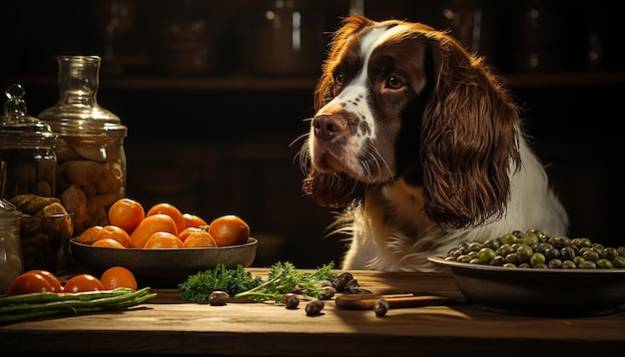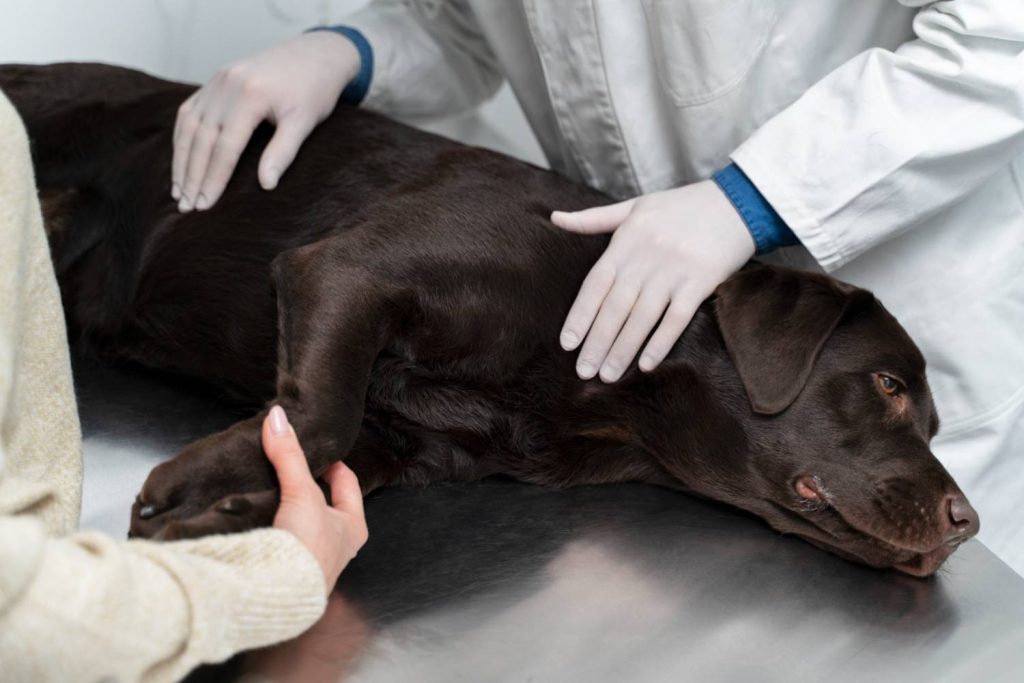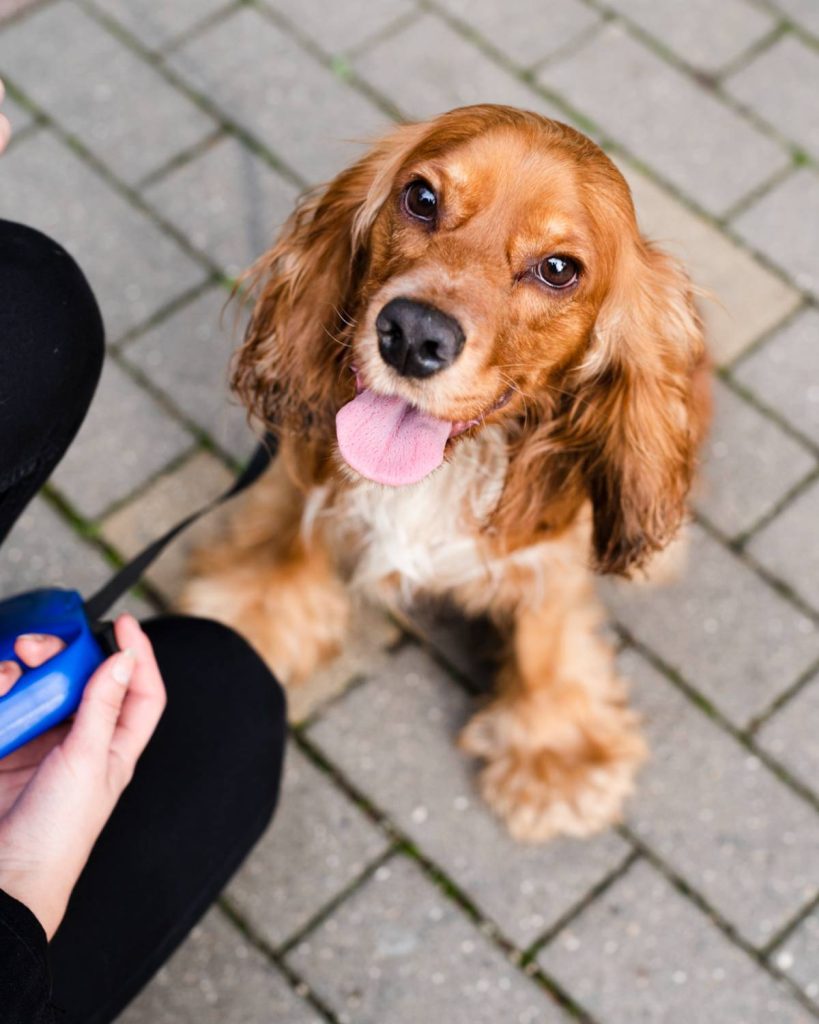
Guest article provided by: petlovesbest.com
A vigilant coat isn’t just visually pleasing; it reflects the general state of your dog’s overall health. The diet has much to do with the development and maintenance of the fur on your furry friend, hence affecting its luster and durability. In this article, we will discuss how slight changes in what your dog eats can make it transform from being flat and dull to being extremely shiny.
Understanding the connection between food and fur health will enable you to be more proactive about what you feed your pet. As we get into it, please remember that there are also tips on how to make the coat naturally better, including finding out things like portable dog washers that can help maintain such a glow-up.
The Importance of Diet for Your Dog’s Coat

A balanced diet is key to a glossy coat. Learn how nutrients impact your dog’s shine.
Significance of Diet
Proper nutrition plays a crucial role in maintaining your dog’s coat health. Here’s why:
1. Nutrient Absorption: By feeding your dog with a balanced diet, you ensure they obtain vital ingredients required for the good health of fur. Otherwise, feeding them improperly will cause their loss of brightness as well as make them susceptible to various problems.
2. Hydration Levels: For good skin and coat condition, adequate hydration is necessary. Intake of water through food maintains the moisture level on the skin thereby averting dryness and flaking.
3. Supports Skin Health: A healthy coat always begins with having healthy skin. Nutritional elements accessible through diet have an important role in keeping good skin integrity to prevent dermatitis and irritation which may affect the quality of fur.
Impact of Specific Nutrients
Specific nutrients play a vital role in enhancing your dog’s coat health:
1. Omega-3 and Omega-6 Fatty Acids: These are essential fat elements responsible for maintaining healthy skins and coats. While omega-3s present in fish oil or flaxseed reduce inflammations hence promoting a shiny appearance, omega-6s contained in poultry fat or vegetable oils help keep the lipid barrier intact thus saving against dryness or itching.
2. Protein: Protein is required for growing strong hair and healthy skin too. Diets based on lean meats like eggs contain enough protein which allows the growth of healthier furs that are strong enough with shine.
3. Vitamins and Minerals: Essential elements such as vitamins A, E & biotin together with minerals such as zinc & copper are crucial in the maintenance of skin health and coat. They contribute to the turnover of cells, help in the production of collagen, as well as maintaining their texture and shine.
Identifying Signs of Poor Coat Health
You have to be watchful all the time and take good care of your dog’s coat to remain vibrant. Below are typical signs that indicate there is a problem with your dog’s fur and why regular checks on it are important for early diagnosis:
Common Indicators:
Recognizing signs of poor coat health is crucial for early intervention:
1. Dullness: Dullness or lack of luster often indicates underlying health problems or nutritional deficiencies.
2. Dryness: Dry and brittle hair accompanied by flakes or dandruff may imply inadequate hydration or a diet poor in essential fats.
3. Excessive Shedding: While shedding is considered normal, hair loss more than usual can indicate malnutrition, hormonal imbalances, or skin-related diseases.
4. Flakiness: Itchy scalp because of allergies, fungal infections, too little omega-3 fatty acids lead to lackluster fur
Importance of Regular Inspections
Regular inspections of your dog’s coat are essential for their overall well-being:
1. Early Detection: By frequently examining your pet’s fur you will be able to notice a problem at its initial stage thereby helping you manage it better before it gets worse.
2. Prompt Intervention: Early detection allows you to quickly respond such as altering their meals, and handling medical problems if any among others.
The secret behind having shiny fur on your dog lies in appreciating how much importance proper feeding has on the general well-being of the canine friend. You need to know what signals show that the fur quality is deteriorating and therefore make it necessary to check them regularly so they can be corrected ahead of time thus resulting in much easier control measures

Essential Nutrients for a Lustrous Coat
The shiny appearance of your dog’s coat is indicative of their inner well-being as well as the nutrients they get. This is why it is important to make sure that they get the right nutrients in their diet to give their coats the glossy look they deserve. The key nutrients crucial for optimal coat health are discussed below:
1. Protein:
Protein is crucial for your dog’s health:
- Essential in building and repairing tissues, skin, and fur included.
- Encourage better growth of hair follicles, which form strong hair.
- Found in lean meats, fish, eggs, and leguminous plants.
2. Vitamins (A, E, Biotin):
Vitamins play a vital role in skin and coat health:
- Keeps skin healthy and helps produce sebum for a shiny coat.
- It acts as an antioxidant protecting skin cells.
- Promotes healthier skin and fur by metabolizing proteins and fats.
- Liver, eggs, leafy greens, and whole grains are good sources among others
3. Minerals (Zinc, Copper):
Minerals are essential for maintaining skin and coat integrity:
- Important for maintaining an intact skin barrier and facilitating healing in case of wounds.
- Melanin aids in the improvement of pigmentations on the coat through copper synthesis.
- Zinc helps to heal skin lesions while copper enhances melanin production hence improving pigmentation on the pet’s vestibulocochlear membrane;
- Both minerals support the overall health of cat fur/skin.
- Food that contains this mineral are Meat, seafood, nuts, and seeds.
Choosing the Right Diet for Coat Enhancement
To ensure that your dog’s fur receives all the essential components necessary to be bright you must choose an appropriate diet. Here are some diet options along with tips that will help enhance your pets’ coat:
1. Commercial Dog Foods:
Commercial dog foods offer convenience and nutritional benefits:
- Look out for high-quality reputable brands that emphasize nutritional balance.
- These include formulas specifically meant to promote coat health and often contain added vitamins, minerals, and omega fatty acids.
Choose options with named meat sources listed as the primary ingredient.
2. Homemade Diets:
Homemade diets offer customization and control over ingredients:
- A veterinarian or canine nutritionist can help you create a balanced homemade diet.
- Include different proteins, fruits and vegetables, and grains to ensure a diverse nutrient profile.
- If necessary, provide supplements such as omega-3 fatty acids and vitamins.
3. Raw Diets:
Raw diets provide natural nutrients but require careful handling:
- Raw diets are the most natural form of nutrients.
- Ensure that the diet is properly regulated through advice from a vet nutritionist.
- To minimize contamination of bacteria during preparation.
Tips for Incorporating Essential Nutrients
Ensuring your dog receives essential nutrients for a healthy coat:
- Rotate Protein Sources: This will offer your dog more amino acids supplied by rotating protein sources
- Add Healthy Fats: Therefore consider including fish oil or flaxseed in your dog’s food to make their fur shine and reduce inflammation
- Supplement Wisely: You may want to add specific supplements like multivitamins or Omega fatty acids to address nutritional deficiencies in her food but be sure that she does not consume too much
- Monitor and Adjust: Keep track of your cat’s coat condition regularly so that you can adjust its feeding regimen depending on the deficiencies it experiences
- Therefore, it means that by ensuring essential nutrients are included in its diet as well as selecting a proper way of feeding it, we can ensure that our dogs’ coats will have a high gloss which would be an indication of their good health.

Food To Be Included and Avoided for Your Dogs Health
Ensuring your dog’s health starts with understanding the right foods to include and avoid for a vibrant coat.
Inclusion:
Incorporate nutrient-rich foods like oily fish, low-fat meats, eggs, fruits, and vegetables for a healthy, shiny coat.
- Oily Fish (e.g., salmon, mackerel): It contains Omega-3 fatty acids that make the coat look shiny.
- Low Fat Meats (e.g., chicken, turkey): These contain high-quality protein good for healthy fur growth.
- Eggs: They supply essential amino acids and biotin for strong fur and a glossy look.
- Fruits (e.g., blueberries, apples): They have antioxidants needed for good skin and coat.
- Vegetables (e.g., carrots, spinach): These are rich in vitamins and minerals necessary for coat health.
Non-Inclusion:
When it comes to your furry friend’s diet, steering clear of processed foods and those laden with filler ingredients is key for maintaining a vibrant coat.
- Processed Food: Coats suffer when we feed our pets sugary food with artificial ingredients.
- Foods with Much Filler Ingredients: That type of food is not helpful to furry pets since it may have inadequate nutrients making the coats dull.
Gradual Dietary Changes Implementation
Implementing dietary changes gradually is crucial for your dog’s well-being:
Importance of Slow Changeover:
- Prevents Upset Stomach: Slow introduction of new foods will allow the dog’s digestive system to adjust accordingly
- Reduces Stress Levels: Transitioning slowly helps in reducing rejection or aversion towards new foods
Timescale for Transitions:
Transitioning your dog’s diet should be done gradually over several weeks:
- Week 1 – 2: Initially, small amounts of new food should be mixed with old ones before gradually increasing the ratio.
- Week 3 – 4: The proportion between old food being reduced while the one related to new stuff increasing should enable the transition into predominately feeding on the latter
- Week 5 onwards: After five weeks elapse it is possible to fully switch over to a different regimen by observing any adverse reactions that may arise
Portion Control Adjustment:
Maintaining appropriate portion sizes is essential for your pet’s health:
- Take Note Of Your Pet Weight: Modify quantities given according to weight change as well as activity rates
- Discuss With Your Vet: Enquire about amounts that are ideal for your particular breed
- Monitoring Progress and Seeking Veterinary Advice.
Monitoring progress
Keep an eye on your pet’s well-being and coat health:
- Look At The Condition Of The Coat: Check if the coat is more shiny, has better texture, and looks healthier generally.
- Assess General Well-being: Look out for changes in appetite, energy levels, or behavior that indicate anything worrisome.
Seeking Veterinary Advice:
Consult a veterinarian if needed:
- No Positive Outcome: If you have changed the diet but your pet’s skin does not become healthier, it means you should go to a veterinarian.
- Catering For Specific Needs: Veterinarianscano suggests customized supplements or diets that cater to unique issues.
Having a healthy coat depends on feeding your dog with well-balanced food that suits its needs. By incorporating fur-friendly foods, introducing gradual dietary changes and closely monitoring progress, one can make sure their furry companion’s fur remains healthy and full of life. Remember to seek veterinary advice if needed as it will help you obtain professional guidance on what to do with your pet’s diet and general well-being.
Conclusion
Maintaining your dog’s coat health requires attention to dietary choices and gradual transitions. By including coat-friendly foods and avoiding harmful ingredients, you can enhance their fur’s shine and resilience. Implementing dietary changes gradually minimizes digestive upset, while regular monitoring ensures progress.
Remember, seeking veterinary advice is crucial for tailored guidance. Your pet can have a bright, glossy coat that shows their inner vigor and well-being with a balanced diet and the right care.
